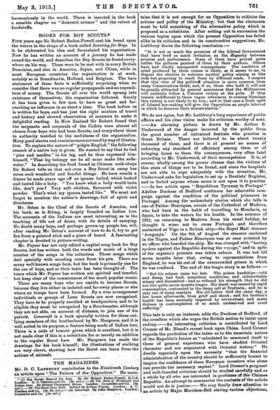BOOKS FOR BOY SCOUTS.*
FIVE years ago Sir Robert Baden-Powell cast his bread upon the waters in the shape of a book called Scouting for Boys. In it he elaborated his idea and formulated his organization. Now he has written an account of a journey be has made round the world, and describes the Boy Scouts he found every- where on his way. These were to be met with in every British Dominion, and also in America, Japan, and China, while in most European countries the organization is at work, notably so in Scandinavia, Holland, and Belgium. The bare statement of these facts is sufficiently surprising when we consider that there was no regular propaganda and no expendi- ture of money. The Scouts all over the world sprang into existence of themselves; the organization followed. Surely it has been given to few men to have so great and far- reaching an influence in so short a time. The book before us is written for boys, and has just the right mixture of travel and history and shrewd observation of manners to make it delightful 'reading. In New Zealand Sir Robert found that the sergeants and corporals of the Cadets were almost all chosen from boys who had been Scouts, and everywhere those in authority testified to the usefulness of the organization. Many good stories and reminiscences are used by way of illustra- tion. To explain the nature of " pidgin English " the following remark of a native boy is given. He wanted to say that he had "pins and needles" in his leg, and he thus expressed him- himself, "That leg belongy me he all same make like soda- water." In describing the food found in Chinese cook-shops Sir Robert tells us that not even a Boy Scout in camp has eaten such wonderful and fearful things. He here recalls a dinner be made years ago off an iguana boiled, which looked and tasted like a baby. " You know what a baby would taste like, don't you ? 'Very soft chicken, flavoured with violet powder. That's what my iguana tasted like." We must not forget to mention the author's drawings, full of spirit and directness.
Mr. Seen is the Chief of the Scouts of America, and his book, as is fitting, is largely founded on Indian lore. The accounts of the Indians are most interesting, as is the teaching of life out of doors, with its details of camping. No doubt many boys, and perhaps grown-up people too, will, after reading Mr. Seton's account of how to do it, try to get fire from a pointed stick and a piece of board. A fascinating chapter is devoted to picture-writing.
Mr. Poyser has not only edited a capital song-book for Boy Scouts, but has written both the words and music of a large number of the songs in the collection. Those songs which deal specially with scouting come from his pen. There are many well-known songs here, but the book is primarily one for the use of boys, and so their taste has been thought of. The tunes which Mr. Poyser has written are spirited and tuneful, but keep clear of the commonness of too much popular music.
There are many boys who are unable to become Scouts, because they live either in isolated and far-away places or else where no troops have been formed. By a wise arrangement individuals or groups of Lone Scouts are now recognized. They have to be properly enrolled at headquarters, and to be eligible they must be recogniZed by a Scoutmaster, although they are not able, on account of distance, to join one of his patrols. Lonecraft is a book specially written for these out- lying members of the brotherhood by Mr. Hargrave, and it is well suited to its purpose, a feature being made of Indian lore., There is a code of honour given which is excellent, but it is not made clear if this is a substitute for or merely an addition to the regular Scout Law. Mr. Hargrave has made the drawings for his book himself; the illustrations of stalking are very clever, showing how the Scout can learn from the actions of animals.


















































 Previous page
Previous page